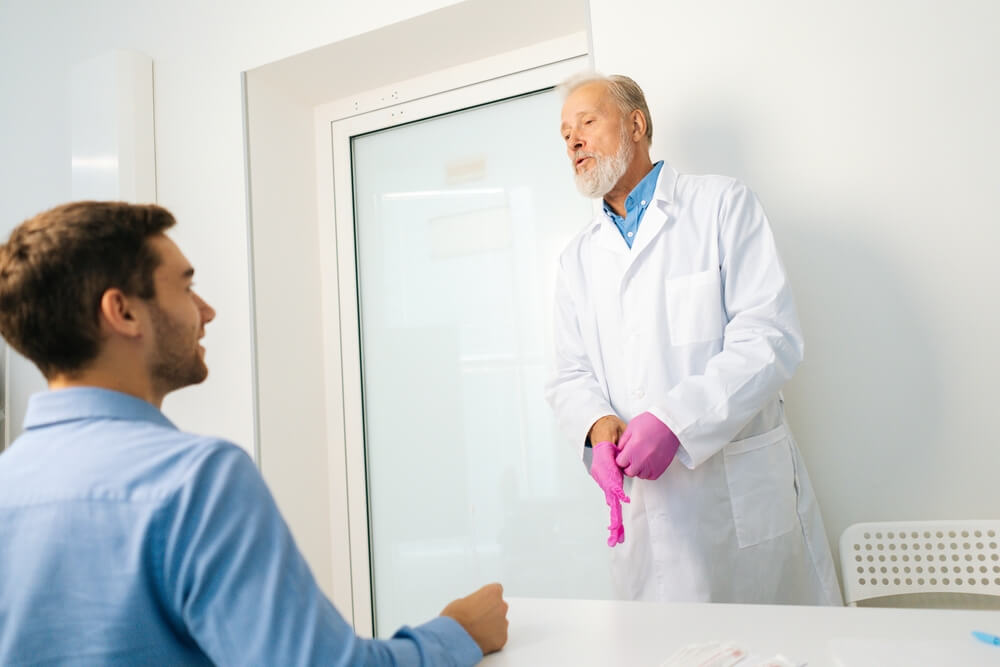What is Rectal Cancer
Rectal cancer can be described as a disease in which the rectum cells start to mutate and grow uncontrollably. The rectum is a part of the large intestine, more specifically, the chamber between the anus and the colon.
The disease can affect both women and men, with males being more at risk of developing the malignancy. For the most part, it affects people older than 50, but it may develop at any age. It is among the more prevalent cancers, with around 5% of the world’s population developing it during their lifetime. Out of them, approximately 11% will be younger than 50.
As a matter of fact, colon and rectal cancers (colorectal malignancies) are the third most common cancers in the US.
In this article, we’ll talk about the signs of rectal cancer and possible treatment options, like chemotherapy, radiotherapy, targeted drug therapy, immunotherapy, and various colorectal cancer surgery options.
After reading the article, feel free to reach out to Dr. Omar Rashid Medicus Elite to learn more about colorectal malignancies and other diseases, such as gastrointestinal cancer.
Causes and Rectal Cancer Symptoms
Unfortunately, most patients don’t experience any rectal cancer symptoms. Still, some patients will be able to notice specific warning signs, such as:
- Bloody stool
- Rectal bleeding
- Constipation
- Diarrhea
- Sudden changes in bowel habits
- Tiredness
- Narrow stools
- Weakness
- Unexplained drop in body weight
- Pain in the abdomen
When discussing the signs of rectal cancer and the leading causes, experts don’t exactly know what changes may trigger the formation of rectal tumors. Still, the medical community agrees that specific risk factors may increase the incidence of malignancy. They are:
- Age: As with most other cancers, the risk associated with this malignancy increases with age.
- Gender: As said before, men are slightly more at risk of developing rectal tumors.
- Race: Statistics state that individuals with darker skin tones are more likely to develop rectal tumors.
- Family history: People who have relatives with rectal cancer are at higher risk of developing the disease themselves.
- Specific conditions and diseases: Some health issues like Chron’s disease, inflammatory bowel disease, and ulcerative colitis may also increase the risks.
- Consuming processed meat: Individuals who overconsume processed and red meat have a higher chance of developing rectal tumors.
- Being overweight: Obesity may also increase the risk of developing rectal cancer.
- Smoking: Research suggests that people who smoke tobacco may also be at an increased risk of rectal tumors.

Rectal Cancer Staging
Experts categorize rectal malignancies into five separate stages. The diagnosis and rectal cancer treatment options will mostly depend on the size of the tumor and whether or not it has metastasized or spread to other organs.
- Stage 0: At this stage, cancer cells have developed on the rectal lining’s surface.
- Stage I: A tumor has formed below the lining and might have grown into the rectal wall.
- Stage 2: The cells have entered the rectal wall and might have affected the tissues near the rectum as well.
- Stage 3: The malignancy has spread to the nearby lymph nodes.
- Stage 4: The tumor has spread to distant organs in the body.
Diagnosing Cancerous Rectal Tumors
In some cases, the issue may be diagnosed during a routine screening. On the other hand, the doctor may recommend additional tests if the patient is experiencing signs of rectal cancer.
More specifically, the recommended tests may include the following:
- Biopsy: When the medical expert takes a small tissue sample from the suspicious area and sends it for laboratory analysis.
- CT scan: Imaging tests that may help establish a precise diagnosis.
- Colonoscopy: The doctor uses a tiny camera on a long tube to view the rectum and the colon from the inside.
- MRI: Radio wave imaging tests that don’t use X-rays like CT scans.
- PET scans: This method uses a special dye to highlight problematic areas inside the rectum.
Rectal Cancer Treatment
The most effective treatment method will depend on the size, the location, and the stage of the malignancy. Furthermore, the patient’s overall health and preferences will also play a role in choosing the best treatment option.
Colorectal Cancer Surgery
Surgery is the most prevalent rectal cancer treatment. The surgical oncologist may offer several different surgeries based on the needs of the patient:
- Transanal endoscopic microsurgery or TEMS. The doctor removes small tumors from the affected area with a special scope.
- APR or abdominoperineal resection. During APR surgery, the doctor may remove part of the colon, the rectum, and the anus. This colorectal cancer surgery is often recommended when the tumor is near the anus, and removing it will most probably damage muscles responsible for controlling bowel movements.
- Low anterior resection. This procedure involves the removal of the rectum, but the anus will be preserved.
Chemotherapy
This may be used to shrink the tumor for surgery or after the procedure to eliminate the remainder of the cancerous cells.
Radiation Therapy
These powerful beams may also be used to kill cancer cells after or before surgery.
Targeted Therapy
Often used together with chemo, targeted drug therapy attacks specific abnormalities inside the cancerous cells.
Immunotherapy
This method uses compounds that boost the immune system helping the body attack the malignant cells.
Preventing Rectal Cancer
Unfortunately, rectal tumors can’t be prevented. Still, people can take specific steps to reduce the risks associated with the disease. As such, they can:
- Commit to regular exercise
- Maintain a healthy weight
- Eat healthy foods
- Avoid tobacco and alcohol

Prognosis
The best outcomes generally happen when the tumors are caught in their earliest stages, as with all other cancers. On the other hand, if the malignancy has spread throughout the body, making a total recovery becomes more challenging. This is why regular screening and reporting every unusual symptom to your healthcare provider is essential.
Also, patients who are undergoing treatment for rectal cancer should immediately call their doctors if they develop:
- Painful headaches
- Fever over 100.4°
- Blood in urine
- Chest pain
- Chills
- Dyspnea or shortness of breath
- Confusion
- Chest pain
Getting Expert Help
Receiving a diagnosis of rectal tumors is an overwhelming experience. Patients may feel anxious, angry, frustrated, sad, and scared. Because of all this, it’s essential that patients find a compassionate and caring expert who can provide them with the resources to help them navigate these challenging times.
Besides choosing a knowledgeable and experienced healthcare provider to treat them, patients are also encouraged to consider joining support groups.
We encourage rectal cancer patients to reach out to Dr. Omar Rashid, a compassionate and knowledgeable expert who understands the power of exquisite care, medical expertise, and patient education. He knows that when patients fully understand their diagnosis and treatment options, they are more likely to regain control of their health.
Schedule an appointment today and find comfort in compassionate patient care and the most advanced medical technologies.


